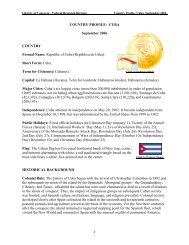1 - American Memory
1 - American Memory
1 - American Memory
You also want an ePaper? Increase the reach of your titles
YUMPU automatically turns print PDFs into web optimized ePapers that Google loves.
Is H.R 7189 anti-union legislation? It is our considered opinion that H.R. 7189<br />
cannot be attacked with any validity as being anti-union legislation. It does not<br />
eliminate totally the right to strike. It merely delays it in the same fashion as is<br />
provided by the 80-day injunction under the emergency strike procedures of the<br />
Taft-Hartley Act. It does not provide for any compulsory arbitration, fact find-<br />
ing or other devices to interfere with the rights of the parties to determine their<br />
w^ages, hours and working conditions.<br />
We will not deny that it has some Impact on the collective bargaining situa-<br />
tion, but again must point out that this Impact is small. We contend, therefore,<br />
that there can be no just case built on the contention that H.R. 7189 Is antl-unlon<br />
legislation.<br />
As stated previously, there is no question but that H.R. 7189 will have some<br />
impact on collective bargaining between the parties. There is also no question<br />
but that a shipping strike seriously affects 800,000 people of Hawaii and the<br />
Territory of Guam and the Trust Territories. It is our contention that the third<br />
party interests in this matter heavily outweigh the de minlmis impact on the<br />
collective bargaining intereits of the parties and that legislative justice dic-<br />
tates the relief from shipping strikes that H.R. 7189 provides for Hawaii, Ouam<br />
and the Trust Territories.<br />
TESTIMONY OF ROBEBT R. GBCNSKY, PRESIDENT, HAW AH EMPLOTEBS COTTNCIL<br />
BEFOBB THE MEBCHANT MABINB SUBCOUUITTEB, SENATE COMMEBCE COMMITTEE—<br />
JANUABT 19I2<br />
I am Robert R. Grunsky, president of the Hawaii Employers Council. There<br />
are over 600 member companies of the Hawaii Employers Council, large and<br />
small, covering almost the entire range of business and Industrial activity in<br />
the State of Hawaii and the Territory of Guam. It is principally through this<br />
wide association that our business communities have maintained a sharp focus<br />
on industrial relations and labor-management practices wliich promote sound<br />
business climate, encourage economic development and improve the business<br />
outlook for the future.<br />
During these hearings, you have already heard from several industry and<br />
business leaders who have given you detailed and specific testimony on the<br />
impact of the current West Coast dock strike on the economic health of Hawaii.<br />
Whenever Hawaii has experienced a shipping interruption, there has been a<br />
marked effect on construction, employment and unemployment, personal income,<br />
retail trade, tourist arrival, price increases and business failures. I have sut)-<br />
mitted to your Committee a review of the economic impact of a shipping strike<br />
on Hawaii. We prepared this research material back in June 1969 at the request<br />
of the Department of Labor in anticipation of a possible .strike by the seagoing<br />
unions. The findings in that review were substantiated in the current situation.<br />
The review also includes a summary of the economic impact felt by Hawaii in<br />
the 1949 and 1952 shipping interruptions. The genera! impact is as follows:<br />
1. Layoffs started within 15 to 30 days after the start of the strike.<br />
2. Inventories were quickly depleted with certain items in short supply within<br />
30 to 45 days.<br />
3. Additional warehouse storage area was required by sugar and pineapple<br />
since they could not ship bulk sugar and canned pineapple to the West Coast.<br />
It also meant a loss in marketing of these products.<br />
4. The consumers price index increased.<br />
5. Retailers felt the impact in declining sales.<br />
I now would like to comment on the labor relations aspect of such stoppages<br />
and the impact of Senate Bill 2836 on labor relations.<br />
With the exception of the 177-d'ay strike of the Hawaii dock workers In 1949,<br />
all other major interruptions In shipping in Hawaii occurred as a result of a<br />
labor dispute outside of Hawaii. No other state in the nation is so uniquely<br />
vulnerable to a shipping tie-up as Hawaii because of its complete dependence<br />
on shipping for the importation and exportation of goods. While giant strides<br />
have been made in air freight, the bulky, heavy equipment and supplies can-<br />
not be flown in on an economical l>asis. The tonnage capacity of a single ship<br />
per voyage (at least 15,000 tons on a container ship) cannot be matched by the<br />
airlines.<br />
It Is the combination of circumstances of dependence on shipping for the<br />
smooth running of our economy And the occurrence of a labor dispute in which<br />
Hawaii Is an innocent third party which makes us an extremely Interested party<br />
to the various bills which have been proposed In Congress to prevent this kind<br />
of a Shipping interruption.



![Albert Einstein Papers [finding aid]. Library of Congress. [PDF ...](https://img.yumpu.com/21604228/1/190x245/albert-einstein-papers-finding-aid-library-of-congress-pdf-.jpg?quality=85)





![American Colony in Jerusalem Collection [finding aid]. Library of ...](https://img.yumpu.com/17941275/1/190x245/american-colony-in-jerusalem-collection-finding-aid-library-of-.jpg?quality=85)



![Piccard Family Papers [finding aid]. - American Memory - Library of ...](https://img.yumpu.com/17941234/1/190x245/piccard-family-papers-finding-aid-american-memory-library-of-.jpg?quality=85)


